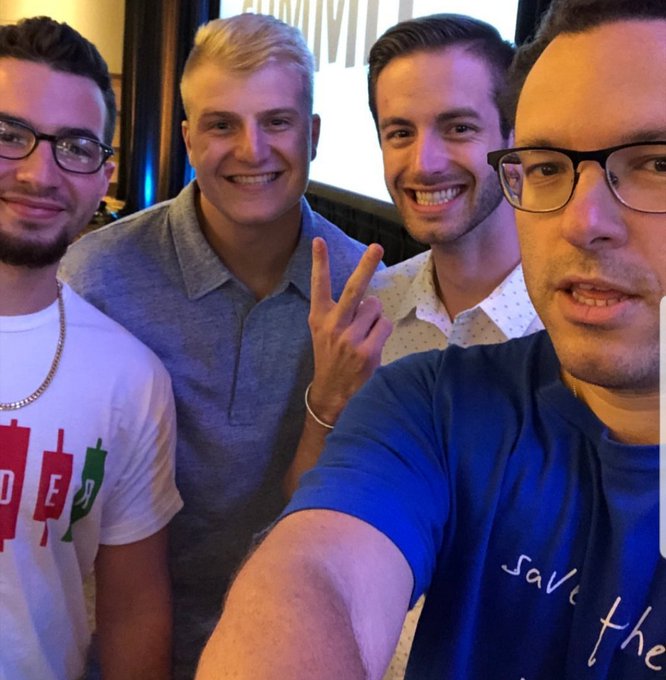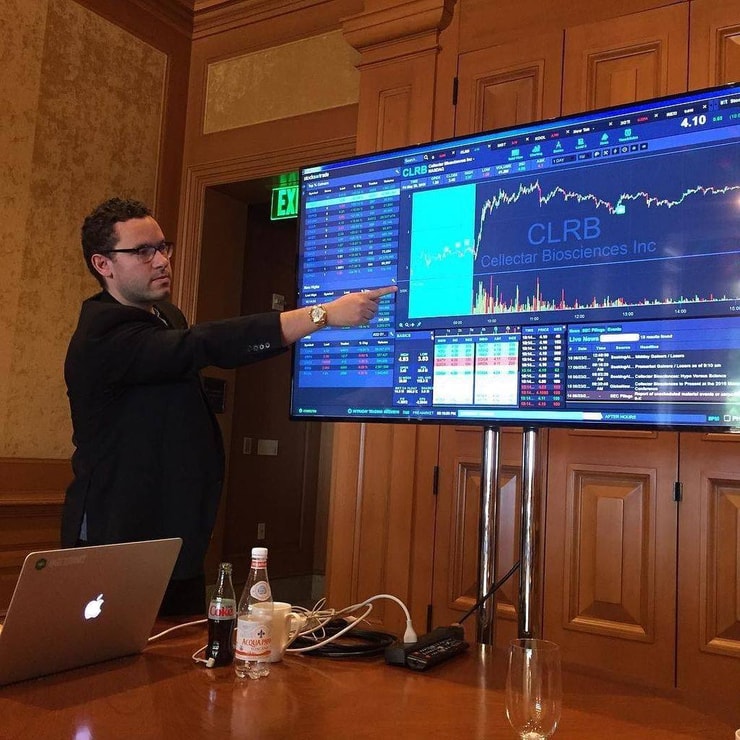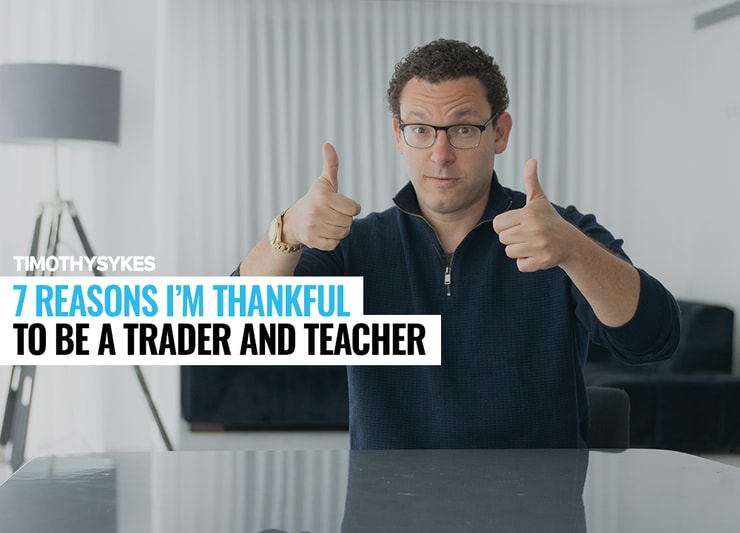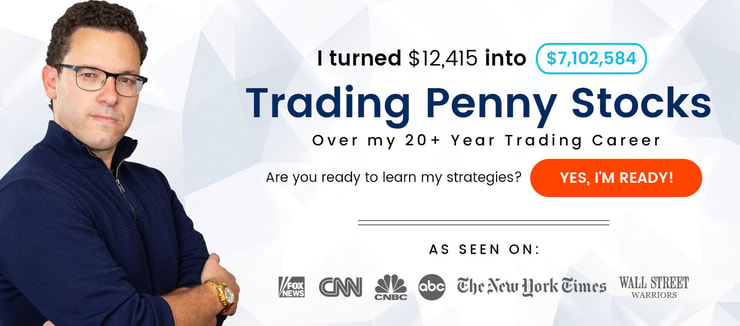I’ve got an attitude of gratitude right about now — so here are 7 reasons I’m thankful to be a trader and teacher.
First, I have to say I’m super thankful for my life, my family, my friends…
For a lot of people, Thanksgiving is a holiday about stuffing your face and football. That’s fine if that’s your thing … but don’t forget to give thanks for all the good things in your life, too.
As a teacher, I like to lead by example. It’s one reason I show every single trade I make. So, here are a handful of reasons I’m thankful to be a trader and teacher … these are some of the biggest reasons that I do what I do.
I want you to find this level of satisfaction in your life, too. As you go through this list, think about your goals and what you want in the future. How can trading help you get where you want to go?
Table of Contents
1. Freedom
I’ve been to over 100 countries. Recently, I hung out with sheep at Mont-Saint-Michel and filmed videos in Australia between trading, teaching, and working with Save the Reef. I even visited some of my top students in the Midwest (OK, not all my destinations are exotic).
I love adventure. I love seeing and experiencing new things and new places. And I get to do this ALL THE TIME.
I wasn’t born into this lifestyle. I’m from a small town in Connecticut. Boring! I get to do all of this because I trade.
For me, the freedom to do what I want, when I want, and from where I want is one of the biggest benefits of trading.
Believe it or not, trading isn’t just about the money for me. I have money. I’ve bought cars. I’ve done all the ‘rich people’ things. But honestly, my biggest motivation to trade is to have the freedom to live the life I want. And money gives me the freedom to do this.
Every time I get to see an amazing sunset or view, I’m grateful. I’m thankful that I’m able to have this life.
Trading has given me the ability to live this kind of life. Do you want this kind of life too? Let that be your motivation to study hard!
2. My Students

I’m SO thankful to have such dedicated and hardworking students … They inspire me to be better in everything I do, from trading to teaching to how I live.
I didn’t have a teacher at the beginning of my trading journey … That’s part of why I’m a teacher: I want to be the mentor to my students that I never had.
I don’t let just anyone join my Trading Challenge. You have to apply. I don’t want to waste my time on people who aren’t committed to studying and learning how to become self-sufficient traders.
My students can see past the tricks of newbies who promise quick riches. My students prefer to learn to think for themselves rather than following someone blindly. They follow my lessons — things I learned the hard way over 20 years of trading.
I can be hard on them sometimes … but it’s because I care. I want my students to live up to their potential so they can make their goals a reality.
So when I see students killing it like @M_Anthony86, it really makes me feel great:
… or like DansGamePoker:
I don’t expect my students to be perfect. But I love it when I see them noticing how they can continue to improve and vowing to do better next time, like @aldopilers.
It gives me hope that my setting an example of being transparent and showing EVERY TRADE might rub off on other traders. Maybe my students and I can have an impact in this industry that’s filled with so many phonies.
More Breaking News
- Core Scientific, Inc. Eyes Potential Acquisition by CoreWeave
- AI Healthcare Surge Drives SoundHound AI Growth
- Recursion Pharmaceuticals Expands Strategic Reach with MIT Partnership
I’m real, and my students are real. I truly appreciate the community I helped create!
3. Patterns That Repeat Over and Over

2025 Millionaire Media, LLCI’ve said it before, and I’ll say it again. I’m really just a glorified history teacher. And I’m so grateful for patterns that play out time and time again. They create opportunities for traders.
Not only have patterns helped me execute the trades that made me a millionaire, but they help me teach my students, too. Patterns will never be exact replicas, but they repeat closely enough that if you observe over time, you’ll start to understand how a potential play might pan out.
The more information and data you have, the more intelligent your trading plan will be. That’s why it’s so important to constantly study and observe the market.
My student @InceNY1 understands the value of studying:
“Getting” penny stocks doesn’t happen overnight. It takes time and effort and, yeah, plenty of trial and error. But eventually, you’ll start to see that the same patterns play out … and over time, you can learn to recognize them.
You won’t be able to take advantage of every opportunity. You might be late to the game sometimes. But don’t fall prey to FOMO. Observe and take notes. There’s still value in observing patterns even if you’re not trading.
Why? More often than not, similar opportunities will arise in the future. It’s not about getting every single one. It’s about learning over time how to recognize them and taking advantage when you do see them, like this:
4. Fraudster Promoters
Yep, I’m even thankful for the fraudster promoters who pump up stock prices.
Why? Because they create opportunities.
Once you know the game, you can see through these idiots … and they give people like me and my students the opportunity to make profits.
Patterns don’t just play out on stock charts. They happen with companies, too.
It happens all the time: a company’s stock goes up for NO reason based on nothing news. And a bunch of chumps buy a ton of shares.
Don’t believe the hype! Instead, recognize these promoters for what they are: fraudsters. And take advantage of the patterns that they create.
Don’t fall in love with companies selling penny stocks. Look at the chart, and look at what’s happened over and over in the past. Trade based on that.
5. My Charities
When I first made money, I was all about fancy cars and partying.
If that motivates you … awesome. But for me, these things had diminishing returns. Now, what really drives me is charity work and taking care of our planet.
I’m super proud that through Karmagawa, I’ve helped open 57 schools and libraries. We just finished four new schools in Bali.
I’m also proud to be involved with Save the Reef. We’re working hard to save the environment. We’ve done a lot, but there’s still SO much more to do. Learn more here.
It used to be that my trading and my charity work were very separate. But now I can also be thankful that my students are starting to take an interest.
This past September at the annual Trader & Investor Summit, we set up a Karmagawa merch stand. I offered to match the total sales from the weekend. We did about $18K in sales, which I topped up to $20K. I added on another $20K of my own money. We then donated that money to the Bali Children’s Project.
I don’t do this work just to get positive PR. I do it because I’m passionate about creating a better world. Because it’s all connected. If our world goes to crap, there won’t be a world to trade in … So I urge you to get interested and get engaged!
6. Family
I’ll keep saying it until you really, really get it: trading isn’t just about making money. It’s about creating and being able to live the life you want.
One of my goals as a trader was to take care of my family. Thanks to the money I’ve earned, I’m able to do that. My mom and dad were my first two employees!
Thanks to trading and my teaching/mentorship work, we don’t have to worry about things like paying our electric bill or how to afford groceries. This might sound like a small thing, but since I’ve seen more of the world … trust me, it’s not something to be taken for granted.
There are so many people in the world who don’t have the luxuries that we just assume will always be there.
I’m deeply appreciative of the benefits trading has given not just me but my extended family.
7. The Ability to Keep Learning and Growing
Ever hear the saying, “When you stop learning, you start dying?” Adaptability is key to survival as a trader, so it’s very important to keep learning and growing.
Personally, I love this.
I love being exposed to new knowledge, new places, and new experiences. For instance, a few months ago I got to stay at a hotel where you can feed giraffes from your window! Who knew that was even a thing?”
Trading is an integral part of my continued growth — not just in the stock market but in life.
Without trading, I might be content to just accept the status quo, work from 9–5, live in a house that I couldn’t afford, and focus on acquiring stuff. To me, that sounds like a slow death.
Trading and teaching both force me to keep looking for opportunities. My work keeps me on my toes. I don’t like being bored, and trading helps me continue to learn and grow. It keeps me from dying inside…
… and for that I’m thankful every day.
Plenty of people do the same thing day in, day out because they think they “should.” Plenty of people are miserable. I don’t want to be one of them. Do you?
Trading Challenge
If you want to invest in yourself and explore the stock market, consider joining my Trading Challenge.
This is your fast track to learning about the stock market and low-priced stocks. I want to teach you what I’ve learned over the past 20+ years. I want to help you take advantage of what I did right … and avoid what I did wrong.
There’s not a ton of hand-holding. You’ll have to apply and prove to me that you’re willing to put in the work to become a self-sufficient trader. Are you up to the Challenge?
You’ll have access to a massive and growing library of DVDs, webinars, and resources like watchlists and trade commentary … And you’ll also be part of a huge community of like-minded traders who will help motivate and teach you, too.
I want to help you find your way in the stock market — on your own terms. But know this is a long-term prospect. No get-rich-quick schemes here.
A Lot to Be Thankful For
If I’d never started trading, my life could’ve turned out very differently. I might not be a millionaire today … I might be a teacher … I probably wouldn’t be where I am today, traveling the world and living the life that I want.
I have a lot to be thankful for … and so much of it is thanks to my work as a trader and teacher/mentor.
I hope this post motivates you to think about what you’re thankful for and to keep working hard to make your dreams a reality!
What are you thankful for this holiday? I love to hear from you!












Leave a reply